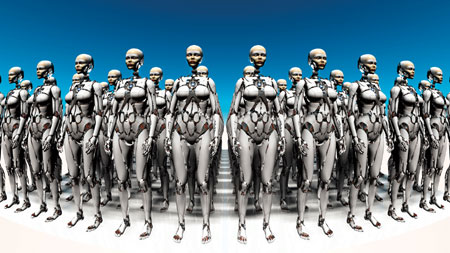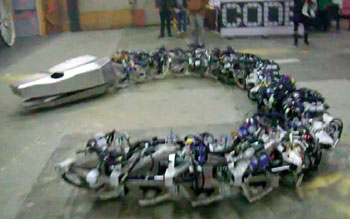“The
truly interesting question is, what happens after we have truly
intelligent robots?
If we’re very lucky, they’ll treat us as pets. If
not, they’ll treat us as food.”
—
|
Dr. Paul Saffo
Stanford University |
Foxconn, also known as Hon Hai Precision Industry, is the world’s largest electronics manufacturer. The Chinese company makes products for Apple, Intel, Sharp, Amazon, Dell, Cisco, Microsoft, Motorola, and Hewlett-Packard. It has factories throughout the world, in China, Brazil, India, Japan, and Mexico, and many others. Among them is the huge Foxconn plant in Zhengzhou, China where over 450,000 workers are employed.
These workers are employed at the massive, Zenchua Science and Technology Park, a walled, 1.16 square mile campus sometimes referred to as “Foxconn City.” There, they live in gray-scale worker dormitories, with little more than a plain room, a small kitchen and bath which they share, and a TV. They toil up to 12 hours a day for 6 days each week. Theirs is a slave drone existence.
Lately, news reports indicate that problems exist at Foxconn City and other manufacturing complexes. Low pay, long hours, and terrible conditions have led to worker mutinies, strikes, and even suicides. Nets had to be installed at the perimeter of all buildings, so many workers were going to the top and just jumping off.
Things have gotten so bad that Terry Gou, the founder and president of Foxconn, finally was forced in 2012 to do something about it.
He brought in robots to replace the disgruntled, complaining employees. According to Singularity Hub, Foxconn president Gou not only brought in the first installment of robots, he also loudly announced that the giant company, the world’s largest, would replace over 1 million workers over the next three years:
|
“It appears as if Gou has started
the ball in motion. Since the announcement, a first batch of 10,000
robots—aptly named Foxbots—have made their way into at least one
factory, and by the end of 2012, another 20,000 more will be installed.” |
Of course, robots themselves must be manufactured. But that presents few problems. In Fanuc, Japan, robots produce other robots. In fact, the concept of self replicating robots is now catching on.
From the corporate and elite standpoint, it seems that Foxconn and thousands of other companies throughout the planet have the right idea. Replace disgruntled employees with sturdy, intelligent robots. And, as robots are growing more and more reliable and trustworthy, a company”s “people problems” are solved.
What of the Workers? What Will They Do?
But, then, what about the over one billion human beings in China, the 900 million in India, almost 200 million in Brazil, and over 7 billion across the world? What are they to do? Where will they find employment? How will they support themselves and their families?The Elite see human beings as merely a “cost of production.” Robots are more efficient, so robots will replace the workers. The humans will be discarded.
We are now beginning to see the results of some 45 years of robotization and automation. This process will escalate quickly in coming years. This is a dramatic change comparable to the Industrial Revolution. Scientists, painters, construction workers, attorneys, taxi drivers, counselors, sex workers. No one is exempt from being laid off as employers find robots more capable, more intelligent, and more useful.
Expect unemployment from here on out to soar as tens of millions are humiliatingly replaced by robots. The Elite do not need you. That’s right. You are not needed. And they soon will grow tired of advancing the “useless eaters” freebies such as free rent, medical care, food stamps, and phones. At that point they will find ways to get rid of you.
|
The Process of Robot Alchemy
In short, you and your families will be killed. This process of thinning out the population has already begun. It is the reason the Elite are now promoting such schemes as “depopulation,” “global warming,” “peak oil,” etc.I call this process “robot alchemy.” In fact, that is the title of my newest book, ROBOT ALCHEMY—Androids, Cyborgs, and the Magic of Artificial Life.
In Robot Alchemy, I demonstrate how breakthroughs in artificial intelligence are now opening the floodgates of change. Dr. Paul Saffo of Stanford University notes that robots are rapidly becoming intelligent, so much so that the average robot will soon be much smarter and more capable than human beings. Dr. David Hanson, founder and president of Hanson Robokind, Inc., calls the new robots “Genius Machines” and says they will constitute an entirely new species.
But it is what Dr. Saffo says about the near future that has so startled and unsettled me. “The truly interesting question,” said Saffo, “is what happens after we have truly intelligent robots. If we are lucky, they’ll treat us as pets. If not, they’ll treat us as food.”
They’ll treat us “as food?” That is what the Stanford University researcher said.
My Investigation of the Robot Challenge
Now this matter so haunted me that for the past six months I have diligently labored to examine the reasons why Dr. Saffo would say such a thing. I admit, I had a head start on my investigation. In 1985, I was pleased to author the first ever book published on personal robots, The Personal Robot Book (McGrawHill/Tab). That book, a main selection of both the computer and electronics book clubs, was followed by others on robotics, including The Great Robot Book (Simon & Schuster) and Careers With Robots (Facts on File).Then, I got off track and over the past two decades concentrated on other important topics. But I never lost my love for and interest in robots and androids and was quickly re-ignited in my passion when I read Dr. Paul Saffo’s controversial statement.
What Happens After Singularity?
What Saffo and a few other top robotics scientists report is that humankind is nearing what robotics and artificial intelligence scientists call singularity. Singularity is that moment in cosmic time when machines (robots) are at parity—they are equal in intelligence and capability—with human beings. After reaching singularity, the robot will rapidly go on to its destiny. It (he/she?) will outthink us, outwork us, and outperform us. The robot will become a superior breed. And there is nothing you or I can do to stop its advance.Vernor Vinge, mathematics professor who, in 1993—that’s 20 years ago!—wrote The Coming Technological Singularity, stated: “Within 30 years we will have the technological means to create superhuman intelligence. Shortly after that, the human era will be ended.”
“The human era will be ended!” Could these frightening words become reality? For over 30 years I have been aware that DARPA, the Defense Department’s premier research agency, has been shoveling billions into robotics research, including for the fields of nanorobotics and neuroscience. Scientists are deep into the Human Genome Project, a commitment to link neural networks, biotechnology, and information science to develop the “Borg.” That is, to electromagnetically link every computer and robot in the world with humankind’s brainpower.
This is not science fiction. It’s real. Human rights experts warn that such a universal network would be “more powerful than the atomic bomb.”
Robots are at the center of this research, research centered not only in Top Secret laboratories at DOD but in corporate laboratories across the globe. We now have advanced robots that are nearly indistinguishable from human beings in function and appearance. Soon, their advantages will become obvious. They will replace humans in tens of millions of jobs, including the legions of low-paid workers in the fast food industry.
When singularity is reached, humans will increasingly look to robots for guidance, wisdom, advice, and leadership. Today, robots walk, talk, hear, and reason. Twenty-five years from now, robots and computers will possess emotion, awareness, and consciousness. They will be superintelligent. They will totally replace outmoded, inefficient, incompetent, human beings.
You Are Not Needed—The New Species Becomes Dominant
Neither the Elite nor their robots will need us. Robots will make other, better robots. And they will repair those other robots. It will be a never-ending cycle. We are now busily creating our own successors.In the early stages of this robotics process, the robots will replace you and me. Humans who object, who cry out for “peoples’ rights,” will become the enemy. The Elite will first use the robots to track dissenters down and kill them. Then, they will kill every “useless eater” in existence.
Next, far later, will come the “Hour of the Robots,” that time when robots, achieving consciousness and self-awareness, will turn on their would-be Masters. Yes, the Elite too, will, in their turn be replaced. Their usefulness will have come to an end. The planet will belong to the robots.
Thus will Dr. Paul Saffo’s poignant question be answered. Will the superior robots treat the remaining, inferior humans as pets... or as food?
Robot Advancements Create Lethal Robots
But, some would object, this cannot happen. Humankind is too shrewd. We will not endow robots with such super-intelligence. Recall Asimov’s “Three Laws of Robotics?” We shall build the robot and teach him to care for us, to attend to our needs. The robot will be an asset. He would not harm his maker.Military Advancements Create Lethal Robots
But, in fact, lethal robots already exist. Hundreds have been murdered in recent months by robotic drone aircraft. America will soon be inundated with tens of thousands of drones overhead. Meanwhile, the U.S. military has developed the EATR robot, designed to run on biomass. The EATR robot will eat sticks, leaves, and dead human bodies for energy. Remember the movie, Soylent Green?The U.S. military has developed Hunter/Killer robots that use facial recognition software and smell to identify and pick human targets out of a crowd. There is the “Cheetah” robot, a steel machine that can run 3 times as fast as a human being. And there is the Alpha Dog, a gigantic, powerful robot that can hike 20 miles without stopping.
In Japan is the fearsome new Titanoboa, a 50-foot long snake robot, and the United States prides itself on its many spy and death robots cleverly disguised as mosquitoes, bees, and birds. Don’t be outside during a swarm of these deadly creatures.
|
My hope is that you will use this knowledge as a catalyst to ponder and consider what humanity is doing and where exactly we are headed. This may just be your—and my—last opportunity to do so.
http://www.texemarrs.com/052013/robot_alchemy_article.htm


No comments:
Post a Comment